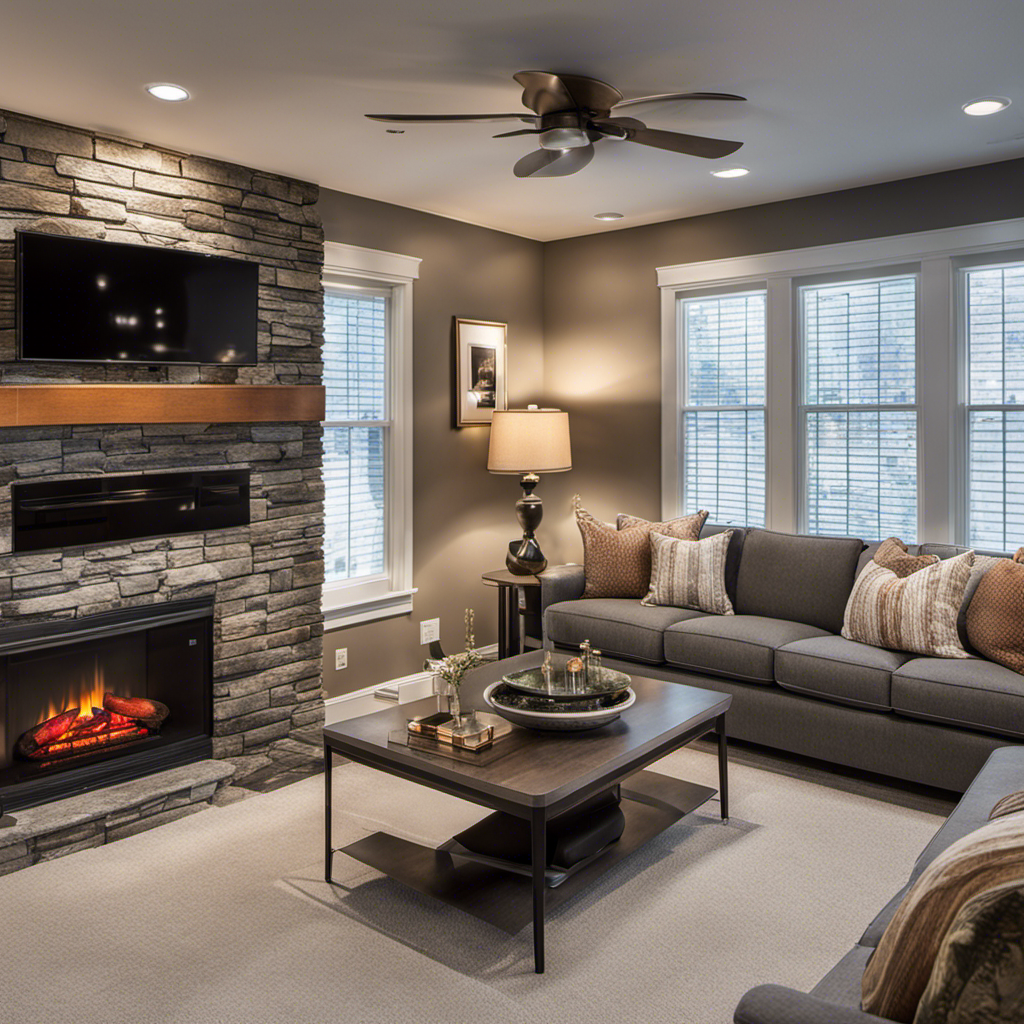In order to ensure the safety and well-being of your household, it is crucial to implement proper safety precautions if your house has a furnace. This article aims to provide essential guidance on how to maintain a safe environment.
By adhering to regular maintenance, proper ventilation, utilizing carbon monoxide detectors, practicing fire safety, storing fuel safely, and preparing for emergencies, you can minimize risks and protect your loved ones.
Stay vigilant and prioritize the safety of your home and family.
Key Takeaways
- Schedule regular maintenance and inspections for your furnace
- Install carbon monoxide detectors in your home
- Have fire extinguishers readily available throughout your house
- Handle and store fuel appropriately to ensure safety
Regular Maintenance and Inspections
Regularly scheduling maintenance and inspections is essential for ensuring the safe and efficient operation of your furnace in your home.
One important aspect of furnace maintenance is air filter replacement. The air filter plays a crucial role in trapping dust, allergens, and other particles, preventing them from circulating in your home. Over time, the air filter can become clogged, reducing airflow and putting strain on your furnace.
By regularly replacing the air filter, you can maintain good indoor air quality and prevent unnecessary stress on your furnace. It is recommended to consult with a professional servicing company to help you determine the appropriate frequency for air filter replacement based on your specific needs.
They can also perform comprehensive inspections, identifying any potential issues and ensuring that your furnace is operating at its best.
Proper Ventilation
Proper ventilation is essential for maintaining a safe and healthy environment in your home when you have a furnace. Good indoor air quality is crucial for the well-being of you and your family, especially since the furnace can release harmful gases and particles if not properly ventilated.
The exhaust system plays a vital role in removing these pollutants from your home and ensuring that fresh air is circulated. It is important to regularly clean and maintain the exhaust system to prevent any blockages or malfunctions that could compromise its effectiveness.
Additionally, consider installing carbon monoxide detectors in your home to provide an extra layer of safety. By prioritizing proper ventilation and maintaining your exhaust system, you can enjoy clean and healthy air in your home.
Carbon Monoxide Detectors
To ensure the utmost safety in your home, it is imperative to both install and regularly test carbon monoxide detectors, as well as educate yourself and your family on the potential risks associated with a furnace.
Carbon monoxide is a colorless and odorless gas that can be emitted by faulty furnaces, posing a serious threat to your health and well-being.
When installing carbon monoxide detectors, it is important to follow proper placement tips to ensure optimal efficiency. Place detectors near bedrooms and on every level of your home, including the basement.
Additionally, it is crucial to regularly check and replace the batteries in your carbon monoxide detectors to ensure they are functioning properly.
Fire Safety Precautions
Implementing fire safety measures is essential for safeguarding your home when you have a furnace. One important precaution to take is to have fire extinguishers readily available throughout your house. These extinguishers should be placed in easily accessible locations such as the kitchen, garage, and near the furnace itself.
It is crucial to ensure that everyone in the household knows how to properly use a fire extinguisher in case of an emergency. Additionally, smoke alarms should be installed on every level of the house, including outside each sleeping area. Regularly test these alarms to ensure they are functioning correctly and replace the batteries at least once a year.
Safe Fuel Storage
Appropriate handling and storage of fuel is crucial when ensuring the safety of your home’s furnace. Following fuel storage safety guidelines and regulations is essential to prevent accidents and maintain the efficiency of your furnace.
When storing fuel, it is important to keep it in a well-ventilated area away from any open flames or ignition sources. Additionally, fuel should be stored in approved containers that are specifically designed for fuel storage.
It is also crucial to regularly inspect the storage area for any signs of leaks or damage and address them promptly. Adhering to fuel storage regulations not only protects your home and furnace but also promotes the well-being of the environment and the community.
Emergency Preparedness
In the event of a furnace malfunction or emergency, it is vital to have a well-planned and practiced emergency preparedness plan in place to ensure the safety of your household and minimize potential damage.
One crucial aspect of this plan is to have emergency kits readily available. These kits should include essential items such as first aid supplies, flashlights, batteries, non-perishable food, water, and blankets.
Additionally, it is important to establish and communicate an evacuation plan with all members of your household. This plan should outline designated meeting points, emergency contact numbers, and escape routes from different areas of the house.
Regular drills and practice sessions will help everyone become familiar with the plan, ensuring a swift and organized response in the event of an emergency.
Frequently Asked Questions
What Are the Signs of a Malfunctioning Furnace That Homeowners Should Be Aware Of?
Signs of furnace malfunction include strange noises, uneven heating, frequent cycling, and increased energy bills. Homeowners should be aware of these indicators to ensure their safety. Taking regular maintenance, installing carbon monoxide detectors, and having proper ventilation are crucial safety precautions.
How Often Should Furnace Filters Be Replaced and What Is the Best Type of Filter to Use?
To ensure the efficient operation and longevity of your furnace, it is important to replace the furnace filters regularly. The frequency of replacement depends on various factors, such as the type of filter used and the air quality in your home. High-efficiency filters offer several benefits, including improved indoor air quality and reduced energy consumption.
Are There Any Specific Safety Precautions to Take When Using a Space Heater in Conjunction With a Furnace?
When using a space heater in conjunction with a furnace, it is important to take specific safety precautions to minimize potential risks. These precautions include proper placement, regular maintenance, and using the heater according to manufacturer instructions.
What Are Some Common Mistakes Homeowners Make When It Comes to Furnace Safety?
Common mistakes homeowners make with furnace safety include neglecting regular maintenance, failing to install carbon monoxide detectors, and ignoring signs of malfunction. Regular maintenance is crucial for ensuring the safe and efficient operation of a furnace.
Can Pets Be Affected by Furnace Emissions and Are There Any Precautions to Take to Protect Them?
Pets can be affected by furnace emissions, and it is important to take precautions to protect them. This includes ensuring proper ventilation, regular maintenance of the furnace, and keeping pets away from the furnace area.


